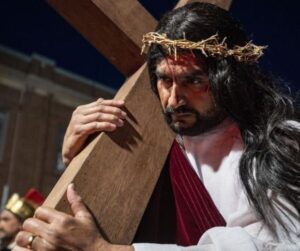If there is one thing common to all people, it is the desire to experience the best of life without the worst, the benefits without the cost, the glory without the gory details. This explains why Good Friday has increasingly been subsumed by Easter in this society steeped in instant gratification – a long-defining characteristic now greatly exacerbated by the advent of the internet.
As Christians, we celebrate the dawn of hope that Easter represents – while non-Christians simultaneously view the day as symbolic of a different kind of resurrection, one of warmth and light following the cold and dark of winter. But while non-believers simply ignore the hard truths of which we are reminded on Good Friday, it seems a growing number of believers avert their eyes from the literally excruciating sacrifice made by Jesus of Nazareth on a cross that Friday more than 2000 years ago. While Catholics in particular will attend services today in large numbers, millions of other believers will choose not to avail themselves of the opportunity to consider deeply the consequences of their sin. They will wait until two days later to celebrate the hope and glory represented by the resurrection.
Good Friday: Pain and Gain

(Photo by Joseph Prezioso/Anadolu Agency via Getty Images)
Good Friday forces us to gaze upon the magnitude of our own sin. It offers a stark reminder of the reality, as no less than the sainted Mother Teresa acknowledged, that even the most righteous among us have fallen so far short of the glory of God that only the barbaric demise of a sinless savior could serve as an acceptable propitiation for our sin – past, present and future – and redeem us. It is a reminder of generational rebellion so deeply embedded in the human soul that only God’s purposefully-induced sacrifice of his “only begotten son” is sufficient to not just save us, but allow us to enjoy eternal life in the rhapsody of God’s kingdom. This life-changing vision answers all the existential questions – why are we here, what is the purpose of our lives, and what is our ultimate destination – which so deeply flummox secular philosophers.
So, whether you plan formal recognition of this deeply sobering occasion at church or not, whether the day triggers profound emotion in you or not, and whether those around you are joining in a chorus of praise or not, take a moment or more to stop and give thanks to the author of salvation.
All opinions expressed are those of the author and do not necessarily represent those of Liberty Nation.
Do you have an opinion about this article? We’d love to hear it! If you send your comments to [email protected], we might even publish your edited remarks in our new feature, LN Readers Speak Out. Remember to include the title of the article along with your name, city, and state.
Please respect our republishing guidelines. Republication permission does not equal site endorsement. Click here.

